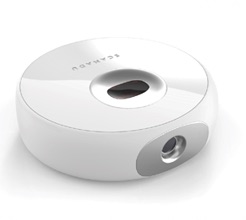 Updated with comments from Scanadu
Updated with comments from Scanadu
Scanadu, a personal health scanner company that shattered records on Indiegogo a few years ago, has raised $6.5 million according to an SEC filing. The new funding, a significant drop from the company's $35 million series B last year, comes at a time when the company is under fire for what many customers see as an unsatisfactory end to its FDA usability trial, as well as Scanadu's elimination from the Qualcomm Tricorder X Prize.
Scanadu didn't respond to multiple requests for comment, so we don't know who the investors are on the round. The SEC form does list one new member of Scanadu's board of directors since the company's 2015 filing: David King, CEO of LabCorp. (A previous version of this story speculated that the investor was a different David King). Scanadu also told MobiHealthNews in an email that, despite the date on the filing, the investment happened earlier in 2016.
We have written extensively in the past about Scanadu's novel approach to FDA clearance for a direct-to-consumer medical device, the Scanadu Scout. Essentially, when the company ran its $1.6 million Indiegogo campaign back in 2013 it was able to offer the not-yet-cleared device to backers as a reward by making all backers usability testers in a pre-clearance trial, run in conjunction with Scripps Medical Center. There was a loophole however: Emails to backers suggested they could opt-in to the usability study and then opt-out after receiving their devices, thus receiving a unit without participating in the trial (the company vehemently denied to MobiHealthNews that it was encouraging this behavior).
Last week, however, those Indiegogo backers, who paid $200 or more for their devices, got an unpleasant reminder that they were technically just testers, not owners, of their Scouts when the company sent out an email saying that the study was now complete and, per FDA regulations, the devices would now cease to function. The implied promise of the campaign -- that the Scanadu Scout would secure FDA clearance and then come to market -- now seems in doubt as well.
"Data collection for the study ended in November 2016," Scanadu wrote in an email to backers. "Scripps Translational Science Institute is currently processing the data collected in the 18-month study survey and will issue its final report in May 2017. We intend to publish the study results in a peer-reviewed journal in collaboration with Scripps. FDA regulations require that we deactivate the investigational devices by May 15, 2017, when the study officially ends, after which the Scanadu Scout devices will cease to function."
Customers are understandably upset since, while the company did inform them of the nature of the relationship when they backed the device, this outcome -- the devices being bricked after a few years of use -- wasn't really acknowledged as a possibility. STAT and TechCrunch have rounded up some of the customer responses to this development, which has also spurned the hashtag "Scamadu".
For its part, Scanadu told MobiHealthNews in an email that "the usability trial for the Scout was completed successfully and provided a significant amount of data".
Last week was also the announcement of the final two competitors in the Qualcomm Tricorder X-Prize, a challenge to develop a personal health sensor in which Scanadu was arguably the most visible competitor. Although it made it into the top five out of an original 34 teams that registered for the contest and 312 teams that preregistered, Scanadu ultimately didn't make the cut. Notably, regulatory input from the FDA was part of the selection process for that contest. Update: According to Scanadu, the part of the process the FDA was involved in, safety testing, was cleared some time ago and was not a problem for the company. The FDA was not involved in the final selection process.
Not only does Scanadu not yet have FDA clearance for the Scout device, it also hasn't yet secured clearance of Scanadu Urine (previously known as ScanaFlo), it's urinalysis device. The company had originally planned to submit that device for clearance in July 2013.
All these developments raise big questions about the future of the Silicon Valley-based scanning company, if not the future of the tricorder itself as a feasible commercial product. It seems clear that the company has had more trouble than it expected getting the go-ahead from the FDA. Whether the new funding will be enough to help the company surmount that challenge remains to be seen.
"We remain committed to bringing innovative technologies to you," the company said in a tweet to one angry backer. "Data from this campaign will help us with future products."












